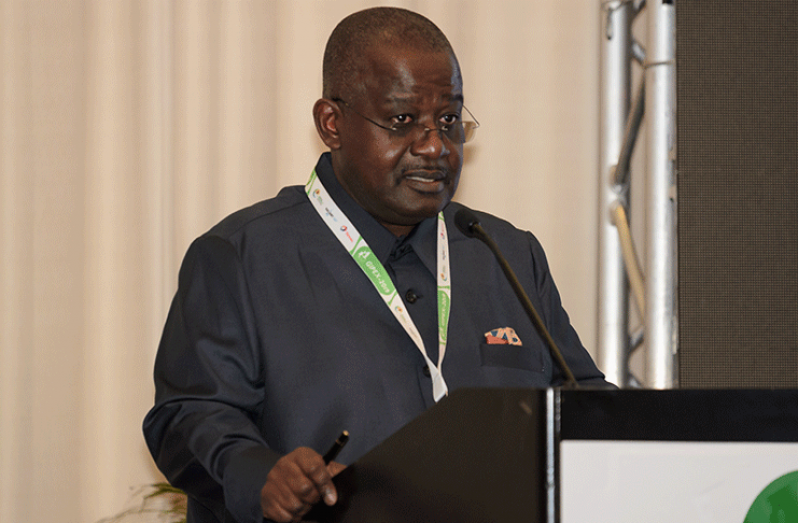…Ghanaian O&G expert says
THERE are numerous similarities between the emergence of the Oil and Gas (O&G) industry in Guyana and Ghana, with much to be learned from in the areas of local content, contract negotiation, transparency and revenue investment.
At the just-concluded Guyana International Petroleum Exhibition (GIPEX) 2019, Chief Executive Officer (CEO) of Africa Energy Consortium, Ghanaian politician, lawyer and diplomat Kwame Jantuah detailed some of those lessons at reference.
Presenting on ‘The Evolution of Local Content: The Ghanaian Example’, Jantuah said that when Ghana found oil, its main concerns were how were they going to spend the revenues with no legislation in place at the time, and how it would ensure that its people would benefit.
“From very early,” Jantuah said, “we realised the oil companies weren’t waiting for us to get our laws in place, because they had shareholders to satisfy, and therefore the onus was on us to chase and catch up with them.”
Like Guyana, Jantuah said, a lot of pressure was put on the Ghanaian government to start legislating for a local-content law. However, a major difficulty they encountered was crafting a definition for the term ‘local content’, so as to ensure that local companies and Ghanaians were the prime beneficiaries of the country’s resources.
Explaining the many challenges the Ghanaian government faced, Jantuah said: “…We realised that foreign service companies and other related foreign companies who were integral to the functioning of the industry were heeding to the law of registering their companies with the Registrar-General’s Department where every company in the country had to be registered by law. And once this was done, they were parading themselves as local companies. And to make matters worse, a lot of fronting was going on with these companies.”
Added to this, he said, international oil companies and services companies were sourcing their employees from abroad to do jobs Ghanaians were capable of doing.
Mix these challenges with the fact that the expectations of Ghanaians were very high, as politicians had expressed a “world-class find” which would be the “end of all the country’s problems”, and it was a manufactured atmosphere of high pressure.
Jantuah said that it wasn’t until the crafters sought out professional negotiators and put on their “legal hat” that they decided upon the word ‘indigenous’ to stipulate that one had to be an ‘indigenous Ghanaian’ to be called a local-content company.
That led to a two-way definition of local content, which first covered the hiring of technical staff, petroleum engineers, welders, fabricators and the purchasing of goods and services, and secondly, partnership with foreign companies.
WHERE GUYANA STANDS
On the other hand, Guyana’s Draft Local-Content Policy could be finalised by the end of 2019.
The policy framework is meant to outline the guidelines by which local content will be understood, developed, measured, secured and implemented in Guyana’s petroleum sector. It takes into consideration the urgent need for the optimisation of revenues received from oil to benefit Guyana’s economy and citizens, present and future.
A key factor, Jantuah noted, is that the definition a country gives to local content must be supported with the relevant conditions for it to be operational.
He explained that the onus is on the country to train its locals to meet the needs and standards of the industry, because, in order to benefit from local content, locals must have the ability to do the jobs.
“We realised after a while the oil companies were not interested in hiring our welders and fabricators, but what we didn’t understand was that welding and fabrication in the oil industry was totally different from normal welding and fabrication, and these had to be trained specifically for the industry,” he said, adding: “One might expect the oil companies to help, but, really, it wasn’t their job to do so. They could give the specification of what grade of technician or welder they required, but it was up to us to meet this specification.
“We therefore set up a welding and fabrication association, and got the oil companies to help bring experts to train members, and also threw an open invitation to those Ghanaians who were working, especially in the gulf countries doing welding and fabrication, to come home and help and they brought their expertise to bear and help train others.”
INNOVATIONS
The country also improved its standards in the agriculture sector by growing fresh produce under greenhouse conditions, which opened local and export markets for the producers, including supply to the energy industry.
Ghana also turned its fisherfolk into divers, seeing that they had no fear of the sea, and taught them new skills in underwater fabrication and maintenance of sub-sea infrastructure. Welders were trained to maintain Containerised Cargo Units (CCUs), machines used to transport equipment and goods to rigs and FPSOs.
Jantuah advised: “Don’t think money; think quality of product, because a good product will bring the money in and make one competitive.” He said that while the time exploration to production for Guyana has been short, similar to Ghana’s, the country ought to accelerate the implementation of requisite laws, training, capacity building. Meanwhile, he urged citizens to remain patient, and to think positively towards the long-term, as several factors can influence production.




.png)









